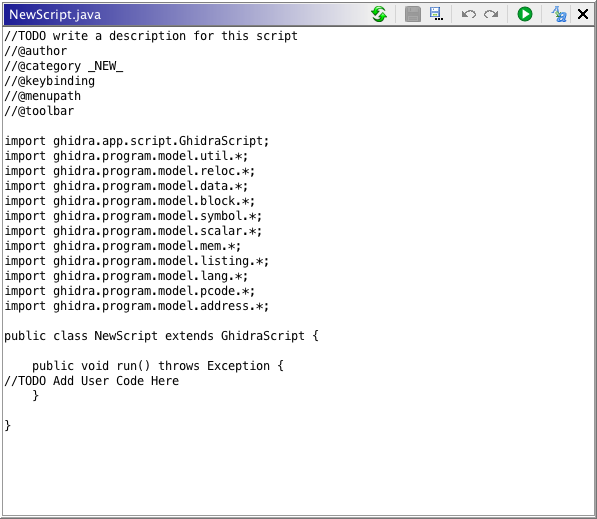The scripting framework supports special meta-data comments. These comments are
treated specially by the script manager.
@author
This tag indicates the author of this script. It may include contact information.
@category
This tag indicates the category path for this script. Category levels are delimited
using the "." character.
For example, "@category categoryA.categoryB".
@importpackage
This tag is used to declare
inter-bundle dependencies as a comma separated list of Java packages. The complete syntax is that
of the
Import-Package attribute in an OSGi bundle manifest.
For example:
@importpackage org.my.script.library
@importpackage org.my.script.library,org.your.script.library
@importpackage org.apache.commons.collections.properties;version=4.4
@importpackage org.ghidra.analysis;version="[1.1,2)"
@keybinding
This tag indicates the default keybinding that will activate this script. If the
Script Manager is unable to interpret the keybinding, it will be ignored. The format for
the key binding is ["ctrl"] ["alt"] ["shift"] [A-Z,0-9,F1-F12]. The format string is not
case-sensitive.
For example:
@keybinding ctrl shift H
@keybinding ctrl alt shift F1
@keybinding L
@keybinding ctrl shift COMMA
@menupath
This tag indicates the top-level menu path. Path levels are delimited using the "."
character. A mnemonic can be defined by adding an ampersand ("&") in front of the mnemonic
key. Ampersands can be escaped by adding another ampersand ("&&").
For example:
@menupath File.Run.My Script
@menupath File.Run.My &Script
@menupath File.Run.Me && My &Script
@toolbar
This tag indicates a top-level toolbar button should be created to launch this script
and the image to use for the button. The Script Manager will attempt to locate the image
in the Script Directories and
then in the Ghidra installation. If the image does not exists, a toolbar button will be
created using the default Ghidra  image.
image.
For example, "@toolbar myScriptImage.gif".
@runtime
This tag indicates which Ghidra script runtime environment is required to execute the
script. It allows for greater control when more than one Ghidra script runtime environment
uses the same script file extension. If left unspecified, the first Ghidra script runtime
environment that matches the script's extension will be used.
For example, specify "@runtime Jython" if the script is targetted for a Jython 2
runtime environment rather than a Python 3 runtime environment.

 image.
image.